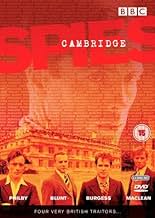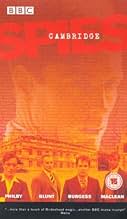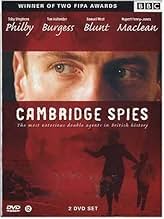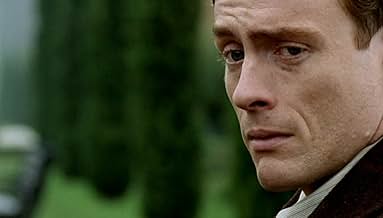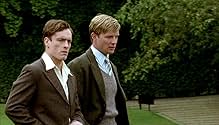AVALIAÇÃO DA IMDb
7,4/10
2,4 mil
SUA AVALIAÇÃO
A verdadeira história de um grupo de estudantes da Universidade de Cambridge.A verdadeira história de um grupo de estudantes da Universidade de Cambridge.A verdadeira história de um grupo de estudantes da Universidade de Cambridge.
- Indicado para 4 prêmios BAFTA
- 3 vitórias e 5 indicações no total
Explorar episódios
Avaliações em destaque
High production values and a great story drive this excellent show along at just the right pace. Never rushed or drawn-out. A few oddities with the script - some things don't seem to flow right but minor. Perhaps the editor put a few bits of film in the wrong place! David Higgs' photography is a joy to watch - it would almost be worth watching without any sound! Aspiring DPs (directors of photography)should look at his lighting, framing and camera movement. Lovely use of long lenses to separate the characters from the background. Older DPs should start to worry!
This is a lightly fictionalised account of how four tewwibly well brought up English boys betrayed their country to the Soviet Union. Philby's father had been a distinguished diplomat and Arabist and McLean's a cabinet minister. All had public school educations and had been undergraduates at the same Cambridge college. They set off into promising careers in the foreign office and security services and were Soviet agents from the start. Their great coup was to give the Soviets enough details about the atomic bomb to speed up their program to build one by a couple of years, but it was at the expense of blowing McLean and Burgess's cover (they escaped to Moscow in 1951), and Philby being fired from MI6. He joined them in Moscow in 1963. Blunt, by now the Keeper of the Queen's Pictures was then interrogated; he confessed, and was let go.
It's one of the really great spy stories of the 20th century. This version concentrates on the personal dynamics. The amount of contact the spies had with each other after Cambridge seems to be much exaggerated (pretty bad security), but gives us the picture of the gang of four against the Establishment. The women are interesting too. Philby was a ladies' man to whom Donald McLean's American wife Melinda (Anne-Louise Plowman) was attracted. They later lived together in Moscow. Blunt and Burgess were both gay, but friends rather than lovers.
The Establishment, in the person of Lord Halifax (James Fox), Ambassador to Washington, found it difficult to believe that 'people like us' could do such things and started looking for the atomic spy in the embassy kitchens. One or two western counter-intelligence operatives including the CIA's formidable James Jesus Angleton nearly nabbed them, but with Philby tipping them off (and duchessing Angleton), Burgess and McLean made it safely to Moscow.
With four hours to play with all the characters are richly drawn. Tom Hollander's Guy Burgess is a drunken dirty little sod who somehow manages to be witty and charming as well. It was great cover for a spy. As Donald McLean, Rupert Penry-Jones is the Golden Boy who feels himself unworthy, and sees communism as the way to redemption. Toby Stephens as Kim Philby gives us the cleverness, the deviousness and the angst as well, especially in the Spanish episode.(I'm afraid us Philbys are a devious lot, but we bleed, we bleed). Samuel West's Blunt has the occasional hint of emotion, but basically is a cold fish. Art, it seems is his life. He does get on tewwibly well with the Queen.
Seventy years on, it's not so much why they did it, but why they kept it up that mystifies. Given their location close to the heart of British Intelligence and hence knowing as much as anybody outside about what really went on the Soviet Union, it's extraordinary that Philby and McLean in particular continued on right up to 1951 (Blunt was more or less inactive after 1945). It is suggested here that Ms McLean did try to get her husband to give up spying but there's no real explanation as to why he persisted. Perhaps he still believed. Anyway, truth or fiction is hardly the point here - Sunday night is not for history lessons. This is a familiar tale well told, visually splendid and not too taxing. The real story, I suspect, is far too complex for even the most adroit (or left) TV producer. An earlier TV account,"Philby Burgess and McLean" (1977) is also worth watching, if you can find it.
It's one of the really great spy stories of the 20th century. This version concentrates on the personal dynamics. The amount of contact the spies had with each other after Cambridge seems to be much exaggerated (pretty bad security), but gives us the picture of the gang of four against the Establishment. The women are interesting too. Philby was a ladies' man to whom Donald McLean's American wife Melinda (Anne-Louise Plowman) was attracted. They later lived together in Moscow. Blunt and Burgess were both gay, but friends rather than lovers.
The Establishment, in the person of Lord Halifax (James Fox), Ambassador to Washington, found it difficult to believe that 'people like us' could do such things and started looking for the atomic spy in the embassy kitchens. One or two western counter-intelligence operatives including the CIA's formidable James Jesus Angleton nearly nabbed them, but with Philby tipping them off (and duchessing Angleton), Burgess and McLean made it safely to Moscow.
With four hours to play with all the characters are richly drawn. Tom Hollander's Guy Burgess is a drunken dirty little sod who somehow manages to be witty and charming as well. It was great cover for a spy. As Donald McLean, Rupert Penry-Jones is the Golden Boy who feels himself unworthy, and sees communism as the way to redemption. Toby Stephens as Kim Philby gives us the cleverness, the deviousness and the angst as well, especially in the Spanish episode.(I'm afraid us Philbys are a devious lot, but we bleed, we bleed). Samuel West's Blunt has the occasional hint of emotion, but basically is a cold fish. Art, it seems is his life. He does get on tewwibly well with the Queen.
Seventy years on, it's not so much why they did it, but why they kept it up that mystifies. Given their location close to the heart of British Intelligence and hence knowing as much as anybody outside about what really went on the Soviet Union, it's extraordinary that Philby and McLean in particular continued on right up to 1951 (Blunt was more or less inactive after 1945). It is suggested here that Ms McLean did try to get her husband to give up spying but there's no real explanation as to why he persisted. Perhaps he still believed. Anyway, truth or fiction is hardly the point here - Sunday night is not for history lessons. This is a familiar tale well told, visually splendid and not too taxing. The real story, I suspect, is far too complex for even the most adroit (or left) TV producer. An earlier TV account,"Philby Burgess and McLean" (1977) is also worth watching, if you can find it.
While not unhistorical, this is a very garbled and misleading presentation of the spies in question. Presumably, historical truth is sacrificed for dramatic reasons. But Cambridge Spies doesn't manage to rise to the level of drama. It's melodrama. There are moments when, if you turn off the sound, you'd swear you were watching a not very good silent movie: sentimental and over-wrought. The Guernica scene is a case in point; Guy Burgess, emoting in the rain, lamenting the death of Julian Bell is another. Rather a waste of acting talent. The main characters in this effort have each done other work that displays their talents to much better effect.
I had heard and read about Kim Philby, of course, but not of the other ones, plus I was not aware of their past and story of formation. Realistic atmosphere, motives well explained and logical, vices and virtues of the protagonists, etc. - everything depicted in a skilful manner. And, of course, the performances, particularly Tom Hollander as Guy Burgess, but also the others - convincing, stylish, but also showing dangers of "elite" and closed communities where depravities are so easy to emerge and develop.
In retrospect, one may ponder on and over how the British authorities were so naive, but, on the other hand, it was an era without much technology and funding to deal with "the own"...
In retrospect, one may ponder on and over how the British authorities were so naive, but, on the other hand, it was an era without much technology and funding to deal with "the own"...
Since no one has said so yet, it seems necessary to add this.
The series is an excellent drama, in every way - no doubt about that. Well worth watching.
BUT.
And that is the point: The subject of this drama is politics, international affairs, government, intelligence - and these are largely absent from the drama.
So if you are prepared to enjoy a view of the events from the perspective of the personal lives of the main characters, then all is fine. But if you were looking for more than tenuous references to the events and forces at play in the world, and an account of how the characters of the story were involved in those events and forces, you will miss something...
This is not to say that it's a bad drama - it's still excellent. And lavishly designed and produced.
But those political events and forces were of historic importance. At a time where the world was still strongly driven by ideological currents, and there was a ruthless struggle for world domination.
In my view, that is even higher drama, and I missed those connections.
The series is an excellent drama, in every way - no doubt about that. Well worth watching.
BUT.
And that is the point: The subject of this drama is politics, international affairs, government, intelligence - and these are largely absent from the drama.
So if you are prepared to enjoy a view of the events from the perspective of the personal lives of the main characters, then all is fine. But if you were looking for more than tenuous references to the events and forces at play in the world, and an account of how the characters of the story were involved in those events and forces, you will miss something...
This is not to say that it's a bad drama - it's still excellent. And lavishly designed and produced.
But those political events and forces were of historic importance. At a time where the world was still strongly driven by ideological currents, and there was a ruthless struggle for world domination.
In my view, that is even higher drama, and I missed those connections.
Você sabia?
- CuriosidadesBased on the same real life events as Memórias de um Espião (1984), History in Faces: Cambridge Five (2011), Philby, Burgess and Maclean (1977), A Question of Attribution (1991), An Englishman Abroad (1983), O Espião Que Sabia Demais (2011), Tinker Tailor Soldier Spy (1979), Blunt (1987), Traitor (1971), Blade on the Feather (1980), O Xeque Mate (1983) and influenced the source novels of O Quarto Protocolo (1987), O Inocente (1993) and others works such as Questão de Lealdade (2004) and Olding (2019), even in minor form like in O Jogo da Imitação (2014).
- Erros de gravaçãoGuy Burgess is in a London flat eating Van Camps baked beans from a can. This brand is not available in England.
- Citações
Guy Burgess: Vladivostok, Moscow, the Kusnetsk Basin, Cambridge - the coldest places on Earth. Of the four, Cambridge is the coldest, permanently February the nineteenth.
- ConexõesVersion of Philby, Burgess and Maclean (1977)
- Trilhas sonorasJerusalem
by Hubert Parry
Principais escolhas
Faça login para avaliar e ver a lista de recomendações personalizadas
Detalhes
- Data de lançamento
- País de origem
- Central de atendimento oficial
- Idioma
- Também conhecido como
- Cambridge Spies
- Locações de filme
- Empresas de produção
- Consulte mais créditos da empresa na IMDbPro
Contribua para esta página
Sugerir uma alteração ou adicionar conteúdo ausente


